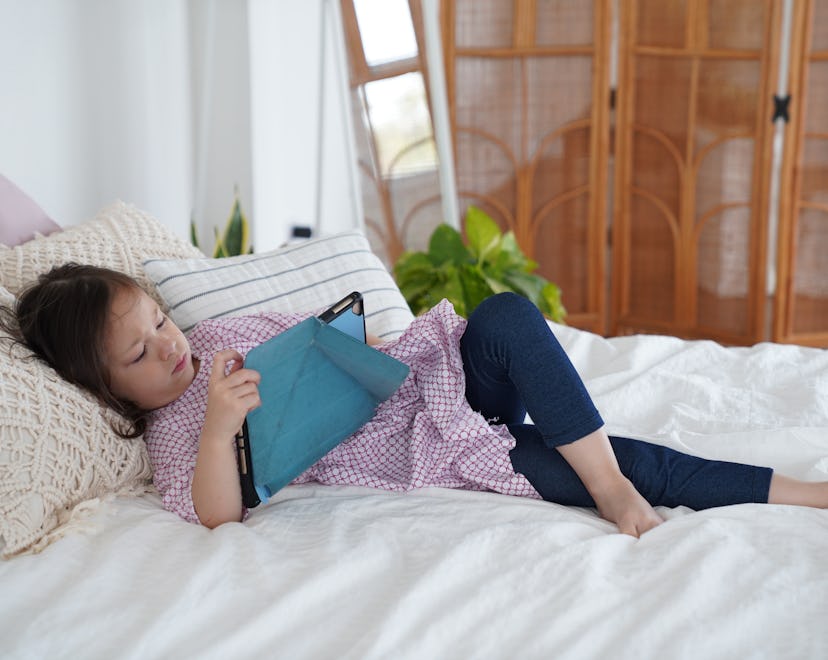Screen Time

We're Thinking About After-School Screen Time All Wrong
The rules aren’t exactly black and white.
The first thing my kids do when they get home from school is grab a snack, and hop on their iPads. As they settle in with their Roblox and ramen time, the stress seems to release out of their body bit by bit. Their shoulders stretch out, the purse of their lips settle, and the nervous energy that accompanies their day ebbs away. For years, I was worried that this was a terrible habit, but lately, I’m thinking after-school screen time isn’t all that bad. In fact, maybe we’ve been thinking about screen time all wrong.
I began to shift my thoughts about screen time when I read that the American Academy of Child and Adolescent Psychiatry’s (AACAP) language about screens wasn’t the negative response most of us would assume. While they do suggest limits for small children, and encourage parents to have their kids engage in a range of activities after school, they are by no means “anti screen.” In fact, the organization noted, “Screens are here to stay and can offer many positives.” So long as you’re not letting them zombie out for eight hours at a stretch, staying stagnant and watching scary movies, your kids are going to be alright.
But a list of bullet points on why it is or isn’t OK, doesn’t really get at the nuance of parent’s concerns. Theoretically, I know that my kids’ love of Minecraft isn’t going to lead them to a career of world domination or building a farm in Vermont to raise undead piglets. This is their stress relief, and it seems far healthier than my doomscrolling while eating spicy potato chips and chugging iced coffee. On a more basic level, I need an expert to calmly talk me off the ledge that sometimes has me thinking I should throw away my kids’ iPads and hand them an abacus, and maybe a chicken.
Since I have no where to put a chicken, and don’t know how to work an abacus (except to shake them like a maraca), I asked clinical psychologist Rebekka Helford what she thinks about kids and screen time. She tells Romper, “Watching TV or playing on a tablet is a behavioral choice, much like each food we eat is a single component of our overall diet. Each choice could have a healthier or less healthy option in and of itself, but it's the big, overall picture of our intake that gives us a sense of whether our cumulative behavioral choices are mostly healthy or not.” Think about how you spent your after-school hours growing up.
While we didn’t have iPads, many of us had televisions, DVD players, Nintendos and Xboxes that we would hang out and watch or play. I, for one, can still speak a fair amount of SIMS dialect, and somewhere in the ether, there’s a character I built, trapped in the bathroom making incoherent noises of displeasure. I also watched a lot of television. I can quote all of Golden Girls and most of Charmed. But I also did theatre, swam at the local pool, and made myself a nuisance at the bakery up the block. The whole was greater than the sum of the parts for us, and it will be for our kids, too, says Helford. The thing about our kids is that their screen time is fixed on just a few devices, and they’re more appealing than ever. And during the last year? We can all admit that our screen time and theirs has hit an all-time high. Now that we’re slowly, stuntedly, perhaps, beginning to claw our way back to a level of normalcy, so will the screen time. And after-school screen time, will be just that — after-school screen time.
We’re not ushering in a generation of children who are unable to do anything but play on screens because as the AACAP said, they’re not going anywhere, and even at the height of the past year, Helford says, “When our kids weren't watching TV, they were playing with us, coloring, reading stories, making forts, going on nature walks. These are the things that matter — the unexpected investments that we've all had to make in family togetherness, and how they have contributed to our children's already robust resiliency.” She says 10 days into the start of the new normal of March 2020, she advised one of her blog readers that “the kids would probably be alright.” 18 months and some change later? “I stand firmly by this assertion.”
And on top of that, our kids are using these screens to relax after school, but they’re also using them because this is how people communicate now, and probably for the foreseeable future.
“Screens are neither the devils nor the messiahs they have been made out to be by various parties,” Helford says. “Yes, many of us have relied on them heavily to get through the last year and a half. Will our kids be irreparably damaged? I can't imagine why.”
Expert:
Rebekka Helford, clinical psychologist